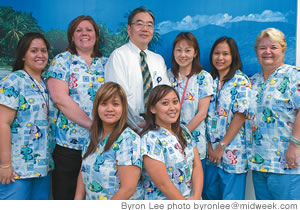Two Quarts Of Urine A Day
Interviewed by Midweek Staff
Wednesday - May 21, 2008
E-mail this story | Print this page | Comments (0) | Archive
 Del.icio.us Share
Del.icio.us Share

Dr. Stephen Chinn
Urologist
What’s your professional title?
I am the chief of urology in the Department of Surgery at Straub Clinic and Hospital, as well as a clinical assistant professor of urology at the John A. Burns School of Medicine. I am also a consultant to Saipan, Guam and American Samoa. For a short time, I had a radio show called Men’s Health Hawaii.
How long have you been practicing?
Nineteen years since completing my residency training in Chicago.
Where did you receive your schooling and training?
I was born and raised here. I attended John A. Burns School of Medicine at UH-Manoa and completed my surgical and urology residency at Cook County Hospital and the University of Illinois (Chicago).
What high school did you graduate from?
Punahou, class of 1974.
Do you have an area of specialty?
I am a general urologist, but I have experience in trauma so I do take calls for several emergency rooms here in Honolulu. I have a personal interest in male infertility and stones.

|
What is urology?
Urology encompasses the medical and surgical management of problems with the genito-urinary system in men, women and children such as tumors, cancers, infections, incontinence, calculi (stones), male infertility and erectile dysfunction (impotency).
What are the most common problems you see?
Urinary infections in both men and women are common. All men have a prostate gland that we monitor for benign hyperplasia (enlargement), cancer or inflammation/infection.
Besides early detection, are there other ways to prevent some of these common problems that happen within the urinary tract?
Much of it has to do with diet and lifestyle. Both for stones and infections, people are probably chronically dehydrated. People ask all the time how much water they should be drinking. The answer is that you are supposed to drink enough water to make eight cups of urine a day, so two quarts or half gallon of urine.
People think you get kidney stones because you drink or eat too much calcium, but actually avoiding calcium in one’s diet can cause kidney stones. So we don’t ask people to restrict their calcium, just to not have an excess of calcium. What’s far more important, especially in women, is to avoid salt because it makes the body excrete calcium into the urine and causes kidney stones and perhaps later osteoporosis.
Smoking is associated with several cancers in the urinary tract, so smoking cessation is important. Vitamin D and lycopenes are supposed to help prevent prostate cancer. So it really is lifestyle and diet that make a big difference in whether not they get stones, infections orprostate cancer.
How much of your practice is clinical and how much is surgical?
About 70 percent is clinical and about 30 percent in the operating room.
What is most challenging about your job?
Basically patients not compliant with their own treatment - knowing that a lot of things we see can be prevented or managed with diet and fluid intake and having those patients come back year after year. That’s frustrating. On the other hand, urologists do urologic surgery, so we are involved with the removal of cancers of the kidney, from the bladder, testicular cancers. Those surgeries are challenging, but it’s very gratifying when we can cure a person of cancer.
What other medical fields do you work closely with?
Urology is interesting in that we work with just about everybody. Half of all the men who come to me with low testosterone levels are referred by psychiatrists since male hypogonadism is associated with depression. We also work closely with OB/GYNs, pediatricians, gerontologists, oncologists and endocrinologists for many interrelated problems.
You mentioned low testosterone levels and depression in men caused by hypogonadism. Can you elaborate on that?
It tends to be more prevalent as a man ages, but I’ve seen men have it in their 20s. As many as one out of every four men in their lifetime will experience something akin to menopause. They can experience some symptoms that women do such as lack of energy, loss of libido, erectile dysfunction, depression, weight gain.
E-mail this story | Print this page | Comments (0) | Archive
Most Recent Comment(s):













